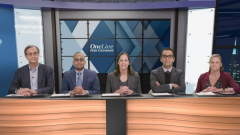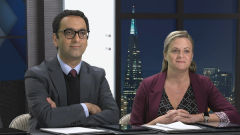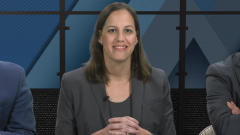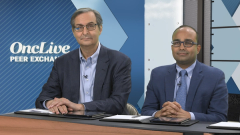
Novel Combination Strategies in mCRC: The STELLAR-303 and SUNLIGHT Trials
Before closing out their review of combination therapy in metastatic colorectal cancer, panelists discuss the STELLAR-303 and SUNLIGHT clinical trials.
Episodes in this series

Transcript:
Kristen K. Ciombor, MD: Speaking of the iterative process and the STELLAR-303 study, the new cabozantinib, XL092, as you mentioned, the big difference in what I know is the difference in half-life between [cabozantinib] and the [XL092] drug. It’ll be really interesting to see the results of STELLAR-303. I don’t know, Dr Hubbard, if you have any comments on that as not the PI [principal investigator] of the study, what you think, and if you think that’s going to be a good trial.
Joleen M. Hubbard, MD: What I think is kind of interesting is that the comparator arm is rego, or regorafenib. If STELLAR-303 is positive, combining XL092 with atezolizumab compared to regorafenib, I won’t know how much did the combination add vs regorafenib because it might just be XL092 has more activity than regorafenib. I’m still very interested in the results, but I think we’ll still be left with a question.
Joel R. Hecht, MD: There is a problem. All these trials, trying to change something with a trial is like turning an aircraft carrier. This is something we saw early, which is the standard of care changes. I think that’s also really important, where does regorafenib fit in the standard of care now in 2023? We’ve learned how to make it a little more tolerable, like the ReDOS trial and colleagues of yours who were able to do that. But I’m not certain that is necessarily going to be the standard of care, and it also may vary country by country.
Kristen K. Ciombor, MD: Speaking of that, I think we’re kind of on the cusp. Tomorrow we’re hearing the SUNLIGHT data, right?
Joel R. Hecht, MD: That’s exactly right.
Kristen K. Ciombor, MD: Dr Kasi, what do you think? The TAS102 [trifluridine/tipiracil] and bev [bevacizumab] vs TAS102, we know it’s a positive study for TAS102 and bevacizumab. Do you think that will change the standard of care and also how we sequence these third-line and beyond agents?
Pashtoon M. Kasi, MD: I think as they say it’s a continuum of care in terms of every patient getting all potential lines of therapy. It gives you the option of adding the anti-VEGF [therapy] for the ones who may be getting the TAS102. But I think it’s the cumulative beneficial effects, that all these are acting as bridges to whatever trial may come along, or the opportunity of rechallenge only works if you have an intervening nontargeted therapy. I also find these regimens as those nonintervening, nontargeted agents, especially for the subset that’s the RAS/RAF wild-type where you need that time off of these therapies.
Kristen K. Ciombor, MD: Kind of like a bridge therapy.
Pashtoon M. Kasi, MD: Or preventing the cumulative toxicity. We were talking about the toxicities of hair loss and acne from anti-EGFR. I’ve had patients who said it’s one thing they want to stay away from, or even the changes with the eyelashes and stuff can sometimes require procedures. Cumulatively you can’t just keep using these drugs. There is the rechallenge, but there’s also the reintroduction because you need a break from the toxicity.
Joel R. Hecht, MD: Isn’t it interesting though that basically you have, especially in someone who has a RAS mutation, [the prospect of] being on an anti-VEGF agent now throughout your entire time. Which is different than for other…it’s still signal transduction, it’s just a different type of signal. We tried, I ran a trial and there was also a European trial where we added VEGF plus bevacizumab to panitumumab, and people did worse rather than better because of extra toxicity, you can only add so many things together. They did get that time off. But if you think about it, now someone who has a RAS mutation in their tumor starts with bevacizumab at the beginning. They get bevacizumab in the second line. They may get to TAS102 plus bevacizumab. If they’re still doing OK, they might get a small-molecule TKI [tyrosine kinase inhibitor]. I’m saying this is in the community, not at your institution where you have other studies. They basically finish with something inhibiting the VEGF pathway the entire time.
Joleen M. Hubbard, MD: I think that’s what surprised me most about the results of the SUNLIGHT study we’ll see tomorrow. The patients on this study, the majority of them were probably on VEGF inhibition for a couple of years. Then continuing that on, still there’s activity. It just shows how important VEGF is in this disease, and I wish we had more information and more biomarkers to elucidate why. For now, we just have to accept it works. But I think in the future we might have a better understanding of how to use it better.
Kristen K. Ciombor, MD: That’s great.
Kanwal P. Raghav, MD: One thing that’s very interesting about that is we’ve done continuation of VEGF studies in the second line. The lesson we learned is it’s helpful. But if you take a patient population that has prior VEGF exposure, for example the TML study didn’t show as much incremental benefit as say the aflibercept study, only because the aflibercept study didn’t mandate prior VEGF. That difference was there. With SUNLIGHT, it will be very interesting to know, No. 1, how many patients actually got VEGF? And No. 2, was it truly continuous VEGF exposure, or did they get VEGF in say the first line, and then they got an anti-EGFR, and now what’s the time difference between that last VEGF exposure? Because it’s hard to contemplate why biologically there would be so much more synergism with TAS102 that wasn’t seen….
Joel R. Hecht, MD: These were things we were thinking about in the early 2000s, just like we have resistance mechanisms for BRAF, that perhaps you actually are upregulating other mechanisms as well to overcome, because people do progress on bevacizumab. Then suddenly you take it away. Now it’s an antibody, so you don’t suddenly take it away, maybe that also may make a difference. But you do take it away, and maybe just adding it back makes a difference. It’ll be really interesting to see tomorrow.
Transcript edited for clarity.







































